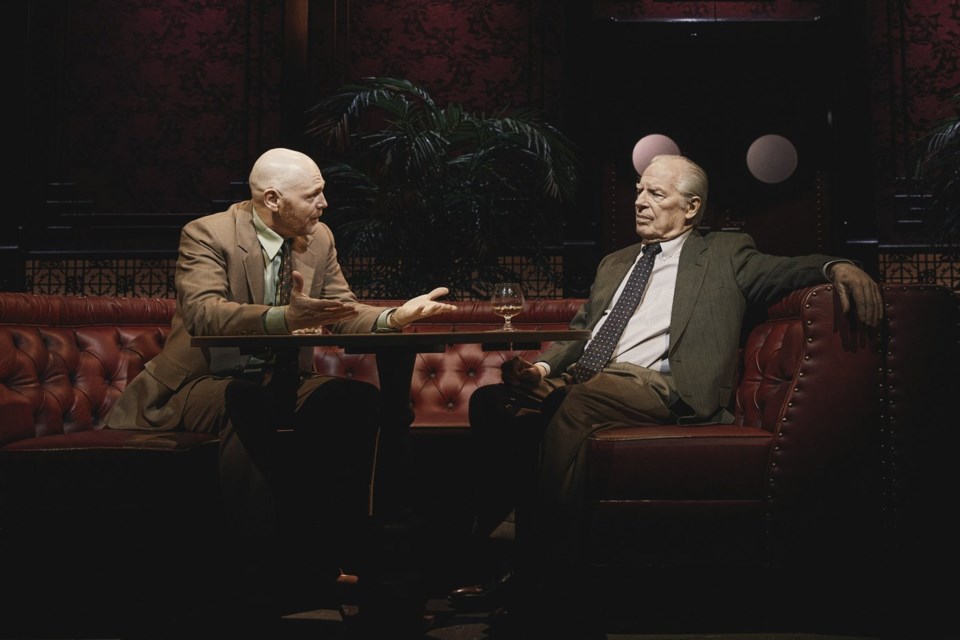Here it comes, almost like clockwork: Another opens on Broadway with a new set of actors trying their luck with cutthroat look at business, like a “Hunger Games” for real estate.
breakout joins “Better Call Saul” star and in a crackling, non-showy and well-balanced production that opened Monday at the Palace Theatre.
The trio will likely get a standing ovation every night, but it's the casting that really sings. None of the leads are outside their comfort zones.
Culkin is really just playing a more spikey, foul-mouthed version of Roman Roy, portraying the smug, big dog salesman with his trademark off-kilter sarcasm, a natural with Mamet's angular psycho-babble.
Other Richard Roma portrayers have been snarling, muscle-and-bone heavies, but not the slight Culkin, here preening from a desk or mocking others by childishly mimicking their movements. He went from Roman to Roma.
Odenkirk also retains some of Saul's small-time con artist as Shelly “The Machine” Levene, the once-winning-but-now-struggling salesman. Odenkirk wrestles with the desperation in the first act but struts about marvelously after he's gotten a boost in the second, like an injection of B12. He channels a little with fluttering hand gestures and a tendency to go unhinged.
Burr — perhaps the least expected to shine on theater's biggest stage — almost steals the show, perfect for the volcanic Dave Moss, a twitchy ball of fury unleashing f-bombs at a machine-gun rate, which seems in synch with He turns out to be the most comfortable with Mamet's tricky dialogue.
The cast also includes a wonderfully sad sack salesman, Michael McKean as George Aaronow — a little slow on the uptake in Act One and utterly flustered in Act Two — and a superbly slow-building Donald Webber Jr. as the manager.
This is the third revival of the play on Broadway, having previously attracted the likes of , Bobby Cannavale, David Harbour, Alan Alda, Liev Schreiber and Joe Mantegna. A movie version starred Pacino, Jack Lemmon and Alec Baldwin.
The rhythm for this verbal joust-fest — filled with pauses, italicized words, cross-talk and repetition — has to be fast and furious, and director Patrick Marber nails it with military precision. The lighting team has this down to the millisecond, hitting the blackout trigger perfectly.
A slack “Glengarry Glen Ross” is deadly, and Marber keeps everything tight right until the end, when McKean speaks the famous “Oh, God, I hate this job” and Roma launches the play’s last line simultaneous with the word “job.”
The play is set in a seedy Chicago real estate firm whose business consists mostly in trying to con old folks into buying dubious Florida properties with picturesque names like “Glengarry Highlands.” The other setting is a Chinese restaurant, this time rendered a little more elegant than expected.
The salesmen are loathsome, with no moral center other than winning. Each scene has someone trying to sell someone else — on a property, an idea or a scam, even if they'll commit a robbery at the office. They think they're swashbuckling pirates, of course.
“It’s not a world of men, Machine,” Roma tells Levene. “It’s a world of clock watchers, bureaucrats, officeholders ... there’s no adventure to it.”
The dialogue is filled with casual racism and sexism, a reminder of where we were in the early 1980s in testosterone-filled offices. What's fascinating today is that the play opens just as the U.S. president — from Florida who got his start in real estate and brags he knows how to close a deal — blusters his way through a second term, promising to eliminate progressivism.
A new “Glengarry Glen Ross” arriving just as we turn back the clock seems appropriate.
Mark Kennedy, The Associated Press



